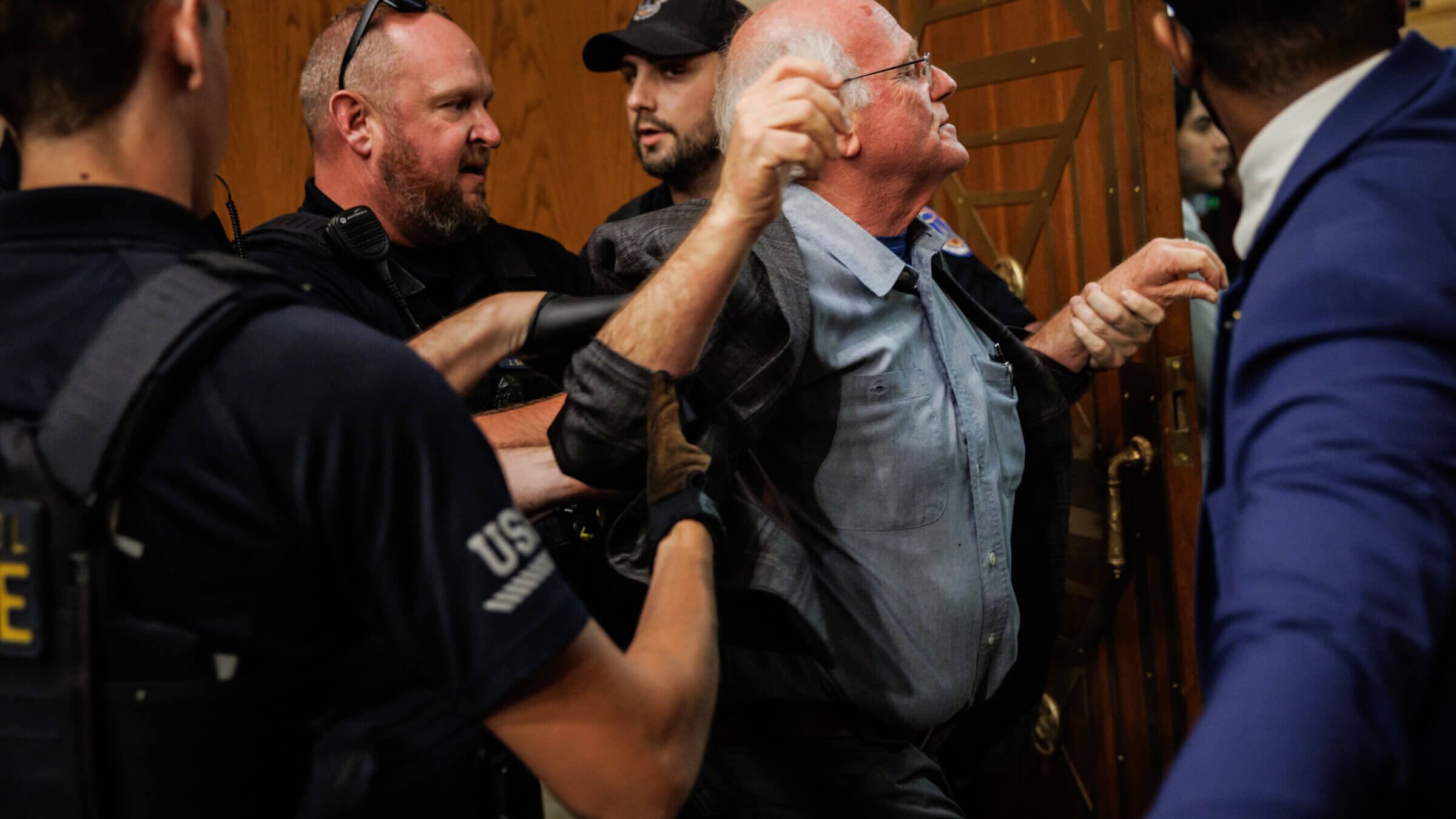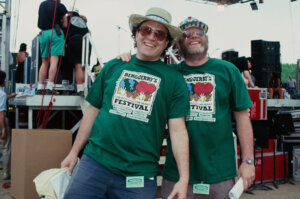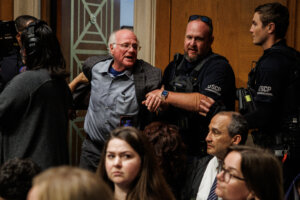Ben & Jerry’s co-founder was arrested this week — it was far from the first time
Since the ice cream company was founded in 1978, activism has been (half) baked into the brand’s DNA

Ben Cohen, co-founder of Ben and Jerry’s, is detained by U.S. Capitol Police for disrupting proceedings during a hearing with U.S. Secretary of Health and Human Services Robert F. Kennedy Jr. Photo by Getty Images
Ben Cohen, the co-founder of Ben & Jerry’s, was arrested Wednesday while protesting at a U.S. Senate hearing. In a video he posted on social media, police officers push and shove him while he shouts, “Congress kills poor kids in Gaza by buying bombs, and pays for it by kicking kids off Medicaid in the U.S.!”
To those who haven’t been paying attention, it might be surprising to see the namesake of the U.S.’s best-selling ice cream brand putting his body on the line to demonstrate against the U.S. government. But speaking up about social causes is as much a part of the brand as Rocky Road ice cream.
Cohen and his co-founder, Jerry Greenfield, both 74, have been activists for decades. They have long spoken out against Israel’s treatment of Palestinians in Gaza and the West Bank. And Greenfield, who went to Hebrew school with Cohen in their hometown of Merrick, Long Island, has said that the company’s activism is rooted in his and Cohen’s Jewish values.

Down-to-earth ice cream
Cohen and Greenfield founded Ben & Jerry’s in Vermont in 1978, when they were each 27 years old. Their original plan was to open up a bagel shop. But bagel-making equipment was too expensive for their budget, so they took a $5 ice cream-making class from Penn State and decided to open up an ice cream parlour instead. From the get-go, they were known for their intense, chunky ice cream, but also their down-home aesthetic. While Reuben and Rose Mattus, the Jewish founders of Haagen Daaz, their main competitor at the time, branded their ice cream as culturally refined and vaguely Danish, Ben & Jerry’s cartons featured photos of bearded Ben and frizzy-haired Jerry eating ice cream, and a font that evoked 1960s Haight-Ashbury.
Their “peace and love” ethos is more than just a vibe. Since at least the ’80s, the company has used their success to advocate for social justice. In 1985, Ben & Jerry’s started a philanthropic organization called the Ben & Jerry’s Foundation, which distributes funds based on decisions by Ben & Jerry’s employees. Since 1989, the company has reported annually on what it calls its “Social” performance in addition to its economic performance. In recent years, that has included taking into account measures of the racial diversity of their staff, the portion of their dairy that comes from farms that are repairing the environment, and their honey producers’ labor practices.
The company has gotten involved with a dizzying variety of social issues. For example, in 1988, Cohen founded 1% for Peace, a campaign to redirect 1% of the U.S.’s national defense budget to peace-building initiatives, and sold a “Peace Pop” to raise money for the campaign; in 1990, the business added a “Support Farm Aid” graphic to its cartons in support of Farm Aid, a nonprofit that helps family farmers hold on to their land.
In 2000, Cohen and Greenfield sold Ben & Jerry’s to the British multinational corporation Unilever. The deal was unique in that it created an independent board of directors that weighs in on the company’s social mission, chooses its own directors and will exist in perpetuity. The board has managed to hold a fair amount of sway over the company’s dealings, but it has also come into open conflict with Unilever, especially in recent years.
In 2005, the company collaborated with Greenpeace to build a 900-pound Baked Alaska on the lawn of the U.S. Capital to protest proposed oil drilling in the Arctic National Wildlife Refuge. In 2011, the company’s board of directors publicly supported the Occupy Wall Street protests.
In a 2020 interview with The New York Times, Greenfield attributed much of Ben & Jerry’s success to its social mission. “Some other company could start making ice cream with big chunks the same way Ben & Jerry’s does,” he said, “but Ben & Jerry’s having this activist, outspoken social mission — other companies can’t copy that.”

Cohen and Greenfield’s demonstrations — and arrests
While their company has become a corporate face of social responsibility, Cohen and Greenfield have also made headlines for political activity in their personal lives. In 2016, they participated in Democracy Awakening protests in Washington, D.C., aimed at protecting voting rights and removing money from politics. They were both arrested along with around 300 others, and charged with “crowding, obstructing, or incommoding,” The Guardian reported.
Since then, Cohen has been arrested at least two other times: in a 2018 demonstration in Burlington, Vermont, against the city hosting F-35 planes at the local airport; and in a 2023 protest in Washington, D.C., decrying the U.S.’s prosecution of WikiLeaks founder Julian Assange.
Pro-Palestinian activism
Among American Jews, the activism that Ben & Jerry’s is perhaps most known for is the brand’s criticism of Israel, where the company has sold ice cream since 1987. In 1998, in response to pressure from peace activists, the company stopped buying water from a company in the Golan Heights, a territory that Israel seized from Syria in the 1967 Arab-Israeli war and has occupied since. Both the Anti-Defamation League and the Zionist Organization of America criticized Ben & Jerry’s at the time, saying that their decision would encourage others to boycott Israeli products.
In 2021, Ben & Jerry’s announced that it would no longer sell ice cream in the West Bank and East Jerusalem, saying that conducting business there was “inconsistent with our values.” The move received applause from the Boycott, Divestment, and Sanctions movement, which also urged Ben & Jerry’s to boycott Israel altogether. But the decision was condemned by some defenders of Israel, such as Israel’s then-Foreign Minister Yair Lapid, who called it “a disgraceful capitulation to antisemitism.”
Cohen told Axios that accusations that Ben & Jerry’s was being antisemitic were absurd. “I mean, I’m a Jew,” he said. “All my family is Jewish. My friends are Jewish.”
“We hugely support Israel’s right to exist,” he said. “But we are against a particular policy.”
In the end, pushback from Israel supporters helped thwart Ben & Jerry’s attempt to remove their products from the West Bank and East Jerusalem. On the urging of the Israeli ambassador, several states, including Florida, New Jersey and New York, threatened to divest from Unilever. In 2022, Unilever sold Ben & Jerry’s to a subsidiary, relinquishing the Ben & Jerry’s board of its power to stop ice cream sales in the West Bank. This prompted a legal battle between parent and child that ended in a settlement that allowed local licensee Avi Zinger to sell in the West Bank and East Jerusalem.

Infighting between Ben & Jerry’s and Unilever has heated up since the start of the war in Gaza. In January 2024, the Ben & Jerry’s board publicy called for a “permanent and immediate ceasefire” in Gaza. In November of that year, Ben & Jerry’s sued Unilever for preventing it from making public statements about the war. Those statements would have included a call for a ceasefire, a halt to U.S. military aid to Israel, and support for Palestinian refugees and American protestors. Unilever ultimately fired Ben & Jerry’s CEO David Stever, prompting Ben & Jerry’s to amend their original complaint. In the new complaint, they allege that Stever had been fired as reprisal for Ben & Jerry’s continued advocacy for social causes, including support for Gazans.
And while the Ben & Jerry’s board fights with its parent company for the right to speak up, Ben Cohen himself has been vocal in his personal life. Earlier this month, he spoke with the far-right talk show host Tucker Carlson about the War in Gaza, calling Israel’s siege on Gaza a “genocide,” and decrying the U.S.’s support of Israel’s atrocities. Some Jewish outlets zeroed in on the fact that Cohen said “I love Jesus” in the interview, but he said so in service of a broader point: Cohen said that though he is not religious, he respects Christianity’s moral teachings, and believes many organized religions — branches of Christianity included — don’t live up to those teachings.
Which brings us to this week. On Wednesday, Cohen joined a group of protesters that disrupted a Senate hearing in which Health and Human Services Secretary Robert F. Kennedy Jr. was speaking. In addition to condemning the government’s cutting of social services and indiscriminate attacks on Gazans, he raised alarm about famine in Gaza.
“Congress and Senators need to ease the siege,” he said, while police officers led him down a hallway. “They need to let food in to starving kids.”
Cohen was again charged with “crowding, obstructing, or incommoding,” as he was in 2016 in Washington, D.C. In the video of his arrest this week, he manages to stare into the camera and repeat his demands several times while being roughly handled by men in uniform.
He’d been here before.
















